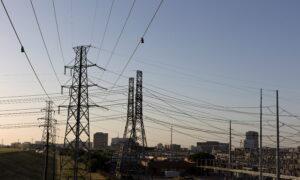Electrical linemen—highly-trained and well-paid—are needed in the next decade to power-up a rapidly expanding grid.
Billy Lang is a commercial truck driver, medic, tree-trimmer, pole-climber, high-wire engineer, and whatever else it takes to keep the lights on.
Lang, 33, of New Milford, Connecticut, is a Class B Journeyman Lineman, one of about 120,000 who tend 450,000 miles of powerlines, 180 million utility poles, and 2.7 million transmission towers across the United States, according to the U.S. Department of Energy (DOE).
“It’s a great job if you don’t mind working outside and are comfortable with heights,” he said.
Five years ago, Lang was an emergency room technician. “I didn’t really like it,” he said. A coworker mentioned her son went to a school and was now a lineman.
“I looked into it. It was just what I wanted,” Lang said, enrolling in the Lineman Institute of the North East (LINE), a 500-hour pre-apprentice trade school in Kingston, New York.
Six months later, he went to work for Eversource, New England’s largest electrical utility with 4.4 million customers in Connecticut, Massachusetts, and New Hampshire.
He completed his four-year apprenticeship about six months ago, he told The Epoch Times, “topping out and becoming a journeyman,” a Class B lineman.
“They said it takes 10 years to make a good lineman,” Lang said, but an aging workforce’s attrition means newcomers must accelerate that timeline.
“Right now,” he said, “there are way more apprentices than experienced linemen. There’s, like, a 20-year age gap; the bulk of [linemen] are 20 years older” than most apprentices.
“The baby boomers are retiring,” said Bill Bosch, Northwest Lineman College vice president of apprenticeships and client solutions. “On any given day, there are 7,000 to 10,000 unfilled jobs in the electrical trade, from linemen, to substation technicians, to metering.”
Electricity demand was relatively static for decades until recent surges exposed shortfalls in electricians and linemen needed to build out a grid set to rapidly expand.
“The trades have not been pushed or have not been in a positive light for 10, 20 years but now, with the compensation, the benefits, the lifestyle, the trades are looked at as a real opportunity to provide a good life for yourself and your family,” Bosch told The Epoch Times.
Northwest Lineman College based in Edgewater, Florida, connects prospective linemen with 15-week courses nationwide that anyone with a high school degree who is fit and willing to learn can enroll in.
“Line school” is the first step to getting hired as an apprentice, Bosch said. “It’s just like attaining a college degree, four years of bookwork and on-the-job training. Many times families have to take a back seat. It takes a lot of time.”
It’s demanding, but rewarding, he said. “I would say a lineman, by definition, is a selfless thinking-of-others profession. They put the public, residential customers, needs before their own,” he said. “They care so much about the industry, the people they work with, the people they provide energy to.”

Billy Lang and fellow Eversource electrical linemen upgrade a transmission line from elevated “buckets” above a busy street in a western Connecticut town. Courtesy Billy Lang
Large Trade, Small World
Complacency is lethal when dealing with electricity, Bosch said. “You have to have a humble confidence. You need to stay humble, but have confidence in yourself to perform, to have safety always first,” he said.
“We would love the public to contact their [Congressional lawmakers] and get this bill passed,” he said.
Being a lineman is more than just a job. There’s “a comradery, a brotherhood, a culture” among powerline workers, Bosch said, noting women need apply. “Some of the best linemen in the United States are women.”
“It’s a large trade but a small world,” he said.
As many as 60,000 linemen a year travel on short notice to natural disasters to rebuild downed power lines, help devastated communities get back onto their feet.
“You make relationships all over the nation. Somebody from the West Coast, California, may get to know somebody in Maine, helping in an ice storm,” he said. “They meet responding to hurricanes” on the Gulf and Atlantic coasts.
Lang, for now, is rarely on storm rosters, although he’s been called to rebuild downed lines in New Hampshire and Massachusetts.
He works 6 a.m. to 4 p.m. Monday through Thursday—three-day weekends every week—across western Connecticut “in older neighborhoods with outdated lower-voltage transmission lines,” replacing them with “bigger poles, thicker wires that are more resistant to tree damage.”
Projects begin with “setting [new] poles, framing poles” followed by “running wire, and then energizing that wire, and shifting load type into the new wire, and then ‘wrecking out,’ getting rid of the old equipment.”
It can be a significant undertaking requiring a police escort and flaggers to control traffic while lineman work above, Lang said.
Like many, he has a commercial driver license and could probably certify as a licensed tree-trimming arborist with chainsaws and hedge clippers standard gear.
Clearing trees from rights-of-way “no one has touched for 30 years, where trees grow into the wires” is an occupational hazard, Lang said, noting branches ensnared in wires stretched “like a banjo string” can be especially dangerous because “the tree can go flying” once disentangled.
“Bee spray is a must for hornets nests that can be under transformers, bug spray for ticks and mosquitoes, sunscreen” are must-haves in the summers, Lang said.
The schooling, certifications, apprenticeship, heat, cold, wind, rain, the expected, and the unexpected, are all part of the job he loves.
“I absolutely believe it was worth it,” Lang said. “It changed my life.”
Original News Source Link – Epoch Times
Running For Office? Conservative Campaign Consulting – Election Day Strategies!


